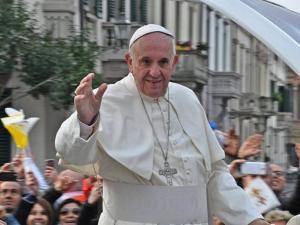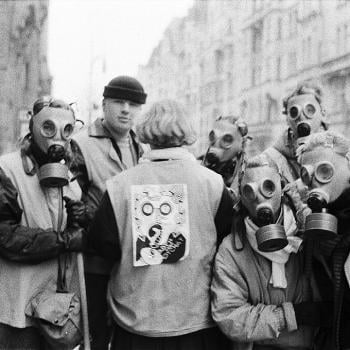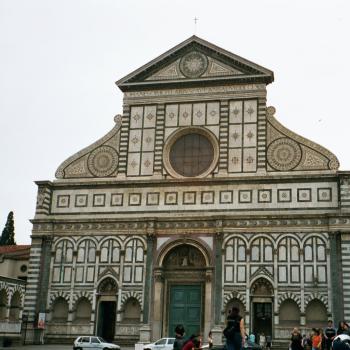
Climate change is real. Even if we do not experience the worst case scenario, a massive extinction event which destroys the human race, we will have to deal with its ramifications for years to come. Sadly, we have not done what we could and should be doing, indeed, too many are actively involved in trying to find excuses to ignore or reject the reality of climate change. As a result, we have seen more and more of the impacts of climate change around us. We don’t have time to ignore it. It is a serious threat, indeed, the threat of our lifetime. How we handle it will determine the fate of humanity and the world at large. We must change our ways. We must establish a new cultural paradigm, one which recognizes our connection to the earth and our moral responsibility to it and the people around us, instead of continuing on with our present day selfish individualism which tries to give excuses as to why we should ignore the common good. This, it can be said, is the message Pope Francis has given us with Laudate Deum (10-4-2023), his new Apostolic Exhortation which continues and supplements his message in Laudato Si’.
We must recognize that our actions, our sins, are a major cause of climate change. Instead of protecting the earth, we have been pillaging it. We have sinned against God because we have ignored our responsibility to the world we live in. That is why we must now give a proper response to our sin by acknowledging it, repenting, and then doing what we can to fix the harm we have caused. This is true for each and every person, even as it is true on all levels of communality, be it national or international:
I ask everyone to accompany this pilgrimage of reconciliation with the world that is our home and to help make it more beautiful, because that commitment has to do with our personal dignity and highest values. At the same time, I cannot deny that it is necessary to be honest and recognize that the most effective solutions will not come from individual efforts alone, but above all from major political decisions on the national and international level (¶69).
Everyone one of us can and should do our part. Even doing a little will help, for if everyone does a little, that will produce a big change. It is important to realize that we must be in this for the long haul. We can’t just do something today, see things get better, and then go back doing things the way we used to, just as, if someone goes on a diet and loses weight, they cannot go back to their former eating patterns without gaining all that weight back:
Nonetheless, every little bit helps, and avoiding an increase of a tenth of a degree in the global temperature would already suffice to alleviate some suffering for many people. Yet what is important is something less quantitative: the need to realize that there are no lasting changes without cultural changes, without a maturing of lifestyles and convictions within societies, and there are no cultural changes without personal changes (¶70).
We cannot rely upon technology to fix the problems which we have created. This is not to say it will not serve a role in healing the world at large, we still must look to the root problem, which is the problem of sin. That means, we must change our ways, otherwise, all we will end up doing is using the technology, and all the advances we have established, in ways which only make things worse. It is because we have not embraced such wisdom that we find ourselves dealing with climate change today. This is why, even if technology can be and should be used to help deal with the problem we have created, we cannot rely upon it to save us. We must not continue with our selfish individualism, using technology only to augment our ability to fulfill our every desire; if we do not work to morally perfect ourselves, our technological advances will only hasten the consequences of our sins. Or, as Vladimir Solovyov explained, scientific and technological advances, when engaged without a similar advance in wisdom and morality, will only hasten our own end:
We need to rethink among other things the question of human power, its meaning and its limits. For our power has frenetically increased in a few decades. We have made impressive and awesome technological advances, and we have not realized that at the same time we have turned into highly dangerous beings, capable of threatening the lives of many beings and our own survival. Today it is worth repeating the ironic comment of Solovyov about an “age which was so advanced as to be actually the last one”. We need lucidity and honesty in order to recognize in time that our power and the progress we are producing are turning against us (¶28).
Thus, we should not ignore the threat which comes from the pursuit of technological power without wisdom, for, with great power comes great responsibility.
Pope Francis says that any honest examination of the facts will see the reality of climate change:
It is no longer possible to doubt the human – “anthropic” – origin of climate change. Let us see why. The concentration of greenhouse gases in the atmosphere, which causes global warming, was stable until the nineteenth century, below 300 parts per million in volume. But in the middle of that century, in conjunction with industrial development, emissions began to increase. In the past fifty years, this increase has accelerated significantly, as the Mauna Loa observatory, which has taken daily measurements of carbon dioxide since 1958, has confirmed. While I was writing Laudato Si’, they hit a historic high – 400 parts per million – until arriving at 423 parts per million in June 2023. More than 42% of total net emissions since the year 1850 were produced after 1990 (¶11).
And, contrary to those who want to suggest it is merely a natural cycle, the reality is that what we see happening has no comparison in history. The speed of the changes happening around us demonstrates the difference between natural climate change and the crisis which lies before us today:
In recent years, some have chosen to deride these facts. They bring up allegedly solid scientific data, like the fact that the planet has always had, and will have, periods of cooling and warming. They forget to mention another relevant datum: that what we are presently experiencing is an unusual acceleration of warming, at such a speed that it will take only one generation – not centuries or millennia – in order to verify it. The rise in the sea level and the melting of glaciers can be easily perceived by an individual in his or her lifetime, and probably in a few years many populations will have to move their homes because of these facts (¶6).
We have more than enough evidence to demonstrate the reality of climate change, even as we have sufficient evidence to demonstrate our role in the crisis. It is not theory. Climate change is already causing havoc around the world. If we do nothing to stop it, it will only get worse, not better. Sadly, humanity has not learned the lessons it can and should learn from other recent crises, like covid; it has not learned to overcome selfish individualism and embrace a communitarian approach to life:
It continues to be regrettable that global crises are being squandered when they could be the occasions to bring about beneficial changes. This is what happened in the 2007-2008 financial crisis and again in the Covid-19 crisis. For “the actual strategies developed worldwide in the wake of [those crises] fostered greater individualism, less integration and increased freedom for the truly powerful, who always find a way to escape unscathed” (¶36).
So many people, including and especially Christians, do not want to acknowledge their sins. They do not want to accept their responsibility to each other and to the world at large. They try every way possible to hide the truth from themselves. This makes ignorance a culpable ignorance. In the end, they will have to face the consequences of their choices. While it is bad for anyone to act in this fashion, it is especially shameful when Christians do so. They might say they care for and love God and God’s ways, but actions speak louder than words, and their actions show they are doing all they can to excuse themselves from what God wants from them. God wants us to take care of the earth, to be like guardian angels to the world; instead, we want to act like devils, presuming that no matter what we do, God will love us, implying that it doesn’t matter what we do. What we do matters. God certainly is a loving God, a merciful God, but God is also a just God. While God’s justice will always be mixed with mercy and compassion, God will work to bring justice into the world, a restorative justice which will make sure that everyone, including and especially Christians, who have caused harm to the world will change their ways and work out their own salvation with fear and trembling. The world and all that is in it is good; we must, therefore, honor God by protecting it:
The Bible tells us: “God saw everything that he had made, and indeed, it was very good” ( Gen 1:31). His is “the earth with all that is in it” ( Deut 10:14). For this reason, he tells us that, “the land shall not be sold in perpetuity, for the land is mine; with me you are but aliens and tenants” ( Lev 25:23). Hence, “responsibility for God’s earth means that human beings, endowed with intelligence, must respect the laws of nature and the delicate equilibria existing between the creatures of this world” (¶66).
Climate change is real. Catholics, Christians, cannot ignore it, for, by our declaration of faith, we have said we will follow the way of Jesus. We can no longer look at the world and engage it through the lens of selfish individualism. The way of way of Jesus is the way of self-giving love. The more we look at the world as something we can take and use for our own pleasure without care or concern of the implications of what we do, the more we find ourselves denying the way of Christ. We might have a life of pleasure here, but in the end, we shall lose it all. Christ told us if we really want to live, to have it all, to have the glory which we seek for and desire, we must change our ways and follow the way of selfless love; when we do so, we will find all that we have given up and lost will be given back to us in a way beyond all that we have given up.
Stay in touch! Like A Little Bit of Nothing on Facebook.
If you liked what you read, please consider sharing it with your friends and family!
N.B.: While I read comments to moderate them, I rarely respond to them. If I don’t respond to your comment directly, don’t assume I am unthankful for it. I appreciate it. But I want readers to feel free to ask questions, and hopefully, dialogue with each other. I have shared what I wanted to say, though some responses will get a brief reply by me, or, if I find it interesting and something I can engage fully, as the foundation for another post. I have had many posts inspired or improved upon thanks to my readers.













